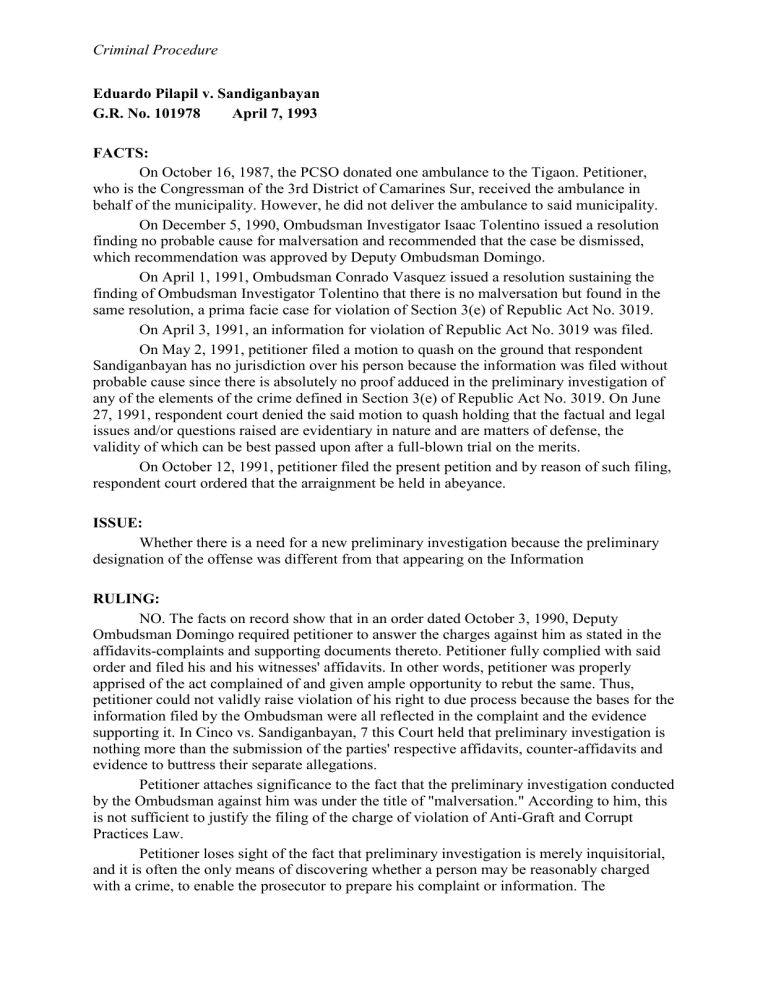
Criminal Procedure Eduardo Pilapil v. Sandiganbayan G.R. No. 101978 April 7, 1993 FACTS: On October 16, 1987, the PCSO donated one ambulance to the Tigaon. Petitioner, who is the Congressman of the 3rd District of Camarines Sur, received the ambulance in behalf of the municipality. However, he did not deliver the ambulance to said municipality. On December 5, 1990, Ombudsman Investigator Isaac Tolentino issued a resolution finding no probable cause for malversation and recommended that the case be dismissed, which recommendation was approved by Deputy Ombudsman Domingo. On April 1, 1991, Ombudsman Conrado Vasquez issued a resolution sustaining the finding of Ombudsman Investigator Tolentino that there is no malversation but found in the same resolution, a prima facie case for violation of Section 3(e) of Republic Act No. 3019. On April 3, 1991, an information for violation of Republic Act No. 3019 was filed. On May 2, 1991, petitioner filed a motion to quash on the ground that respondent Sandiganbayan has no jurisdiction over his person because the information was filed without probable cause since there is absolutely no proof adduced in the preliminary investigation of any of the elements of the crime defined in Section 3(e) of Republic Act No. 3019. On June 27, 1991, respondent court denied the said motion to quash holding that the factual and legal issues and/or questions raised are evidentiary in nature and are matters of defense, the validity of which can be best passed upon after a full-blown trial on the merits. On October 12, 1991, petitioner filed the present petition and by reason of such filing, respondent court ordered that the arraignment be held in abeyance. ISSUE: Whether there is a need for a new preliminary investigation because the preliminary designation of the offense was different from that appearing on the Information RULING: NO. The facts on record show that in an order dated October 3, 1990, Deputy Ombudsman Domingo required petitioner to answer the charges against him as stated in the affidavits-complaints and supporting documents thereto. Petitioner fully complied with said order and filed his and his witnesses' affidavits. In other words, petitioner was properly apprised of the act complained of and given ample opportunity to rebut the same. Thus, petitioner could not validly raise violation of his right to due process because the bases for the information filed by the Ombudsman were all reflected in the complaint and the evidence supporting it. In Cinco vs. Sandiganbayan, 7 this Court held that preliminary investigation is nothing more than the submission of the parties' respective affidavits, counter-affidavits and evidence to buttress their separate allegations. Petitioner attaches significance to the fact that the preliminary investigation conducted by the Ombudsman against him was under the title of "malversation." According to him, this is not sufficient to justify the filing of the charge of violation of Anti-Graft and Corrupt Practices Law. Petitioner loses sight of the fact that preliminary investigation is merely inquisitorial, and it is often the only means of discovering whether a person may be reasonably charged with a crime, to enable the prosecutor to prepare his complaint or information. The Criminal Procedure preliminary designation of the offense in the directive to file a counter-affidavit and affidavits of one's witnesses is not conclusive. Such designation is only a conclusion of law of Deputy Ombudsman Domingo. The Ombudsman is not bound by the said qualification of the crime. Rather, he is guided by the evidence presented in the course of a preliminary investigation and on the basis of which, he may formulate and designate the offense and direct the filing of the corresponding information. Even on the assumption that no preliminary investigation was conducted for the information filed, petitioner waived his right thereto for failure to ask the Sandiganbayan or the Ombudsman for a new preliminary investigation. On this score again, petitioner's case is different from the Luciano and Doromal cases where the attention of the lower court was called to the lack of a new preliminary investigation. Petitioner bewailed the absence of a new preliminary investigation only before this Court. It is noteworthy that his only basis for quashing the information is the alleged lack of jurisdiction of the court over his person because there is no probable cause for the filing of the information. It is well-settled that the right to a preliminary investigation is not a fundamental right and may be waived expressly or by silence. Failure of accused to invoke his right to a preliminary investigation constituted a waiver of such right and any irregularity that attended it. The right may be forfeited by inaction and can no longer be invoked for the first time at the appellate level.

